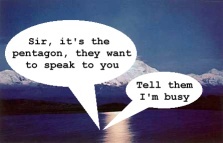Well
it Seemed Like a Good Idea - at the Time
Dialing for Dollars - Navy's Waterproof Phone
A
submersible phone: A great gift idea for the water enthusiast
on your holiday gift list!
 A
few years back, the Navy bought submersible phones for their
carriers because, unlike regular phones, these phones would still
work after they'd been dunked in water. Sounds smart, right?
Think again! Each submersible phone costs about $500 compared
to about $30 for a regular phone. At that rate, the Navy would
have to lose 17 aircraft carriers to cover the cost difference
of just one phone (And, if that happens, the Navy has a
lot more to worry about than the cost of a few telephones!).
So, the Navy smartened up and switched to common desk
models costing about $30 each.
A
few years back, the Navy bought submersible phones for their
carriers because, unlike regular phones, these phones would still
work after they'd been dunked in water. Sounds smart, right?
Think again! Each submersible phone costs about $500 compared
to about $30 for a regular phone. At that rate, the Navy would
have to lose 17 aircraft carriers to cover the cost difference
of just one phone (And, if that happens, the Navy has a
lot more to worry about than the cost of a few telephones!).
So, the Navy smartened up and switched to common desk
models costing about $30 each.
Less
is More - The Federal Specifications for French Fries
If
you think the influence of a document is proportional to its
length, think again. A comparison of these influential and
not-so-influential documents suggests otherwise:
|
The
Pledge of Allegiance
|
31
Words
|
|
Preamble
to the U.S. Constitution
|
38
Words
|
|
The
Gettysburg Address
|
266
Words
|
|
Declaration
of Independence
|
300
Words
|
|
Federal
Specifications for Making French Fried Potatoes
|
2,700
Words
|
 As
part of its effort to cut red tape, the Federal government
purged thousands of pages of lengthy, and often ludicrous,
product specifications. These pages: described how to make
French fries; defined acceptable ashtrays (or, in government-speak,
"ash receivers, tobacco [desk type]"); provided instructions
on how to determine fish freshness; and so on. Does anyone
miss these tomes? Just late-night talk-show hosts who used
them for comic relief.
As
part of its effort to cut red tape, the Federal government
purged thousands of pages of lengthy, and often ludicrous,
product specifications. These pages: described how to make
French fries; defined acceptable ashtrays (or, in government-speak,
"ash receivers, tobacco [desk type]"); provided instructions
on how to determine fish freshness; and so on. Does anyone
miss these tomes? Just late-night talk-show hosts who used
them for comic relief.
Cash
Cows - The Navy Dairy
A
sprawling dairy farm at the U. S. Naval Academy in Annapolis,
Maryland long outlived its original purpose. Why? Apparently
because Congress was overly-attached to its own creation.
Congress
created and stocked the dairy with cows during the early 1900s.
The idea was that the facility would provide the Academy with
its own milk supply after contaminated milk from a commercial
producer caused a typhoid outbreak there. But, by the mid-1960s,
improved processing techniques virtually eliminated the threat
of disease from commercial milk. Moreover, the antiquated
facility became increasingly expensive to run.
The
Navy repeatedly sought Congressional approval to stop operating
the dairy, but it wasn’t until 1997, when the price of the
dairy’s milk exceeded supermarket prices by 30 cents per gallon,
that Congress finally agreed. The Navy milked its last cow
on August 8, 1998.
Purchasing
Power - Government Procurement
Before the reinvention initiative, the typical Federal worker was not authorized
to buy so much as a $4.00 stapler for the office. The government
vested this purchasing power solely in a group of specialists
trained to confront (and sometimes create) the mountains of
paper-work government purchases involved. This policy wasted
time and effort and even prevented Federal employees from
taking advantage of cost-saving sales. When it came to buying
computers, the process was even worse - so cumbersome, in
fact, that by the time the computers arrived, they were obsolete.
Since
1993, however, thanks to recommendations from Vice President
Gore’s National Partnership for Reinventing Government (NPR),
Congress passed a series of laws to streamline Federal
purchasing procedures. Now individual employees can buy things
(up to $2,500) they need for their jobs, using bank credit
cards. Federal workers can now shop around and buy quickly,
saving the government time and money. (For more information
on credit card acquisition, Federal employees should contact
their agency Procurement Office.)
For
more information, visit the NPR
Internet site, or contact William
Ryan at (202) 694-0075.
10/6/99
Home |
Privacy |
Contents |
Comments |
Email Me |
Search